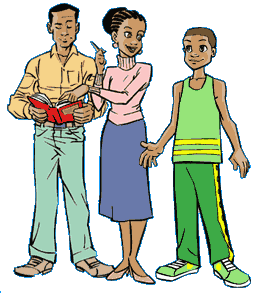NEWS YOU CAN USE
 The news can be full of stories about unexpected or bad things like tornadoes or hurricanes, disease threats, bombings, kidnappings, and war. And the scary thing is — it may seem like these things are happening all around you, even in places where you feel secure like school, the mall, and at home. Seeing these things on TV or even experiencing them first hand (like being in a tornado) can cause you to feel uncertain, worried, or scared. These feelings may last even after the event is over.
The news can be full of stories about unexpected or bad things like tornadoes or hurricanes, disease threats, bombings, kidnappings, and war. And the scary thing is — it may seem like these things are happening all around you, even in places where you feel secure like school, the mall, and at home. Seeing these things on TV or even experiencing them first hand (like being in a tornado) can cause you to feel uncertain, worried, or scared. These feelings may last even after the event is over.
Here are some tips to understanding the news and what you see and hear:
- The news doesn't talk about everyday activities. Instead, the news talks about things that are out of the ordinary — both good and bad. And sometimes it seems like the news shows more of the bad stuff — things like tragedies and crime. For example, if a plane crashes, it will get a lot of attention in the news — so much so, that you may think planes crash all the time. But in fact, thousands of planes take off and land safely each day — the news just doesn't talk about it.
- Sometimes you see stories over and over about tragic events like bombings, or disasters such as floods, earthquakes, or hurricanes. This doesn't mean these things are happening all the time — it just means that the news is talking about it again. The news will cover something when it first happens and then repeat the story. So you may see it on the news when you get home from school and then again before you go to bed. After the first day, the news may do what is called a "follow-up" story to tell you what happened after the event. So you may hear about the same thing for a few days, even though it only happened once.
 Bad things in the news can alert you to what is going on around you. For example, a news story could tell you about someone in your community who is breaking into homes. While this may scare you, just remember that even though it's on the news, that doesn't mean it will happen to you. But stories like this can help make you aware of your surroundings and of things you can do to protect yourself (like locking your doors!).
Bad things in the news can alert you to what is going on around you. For example, a news story could tell you about someone in your community who is breaking into homes. While this may scare you, just remember that even though it's on the news, that doesn't mean it will happen to you. But stories like this can help make you aware of your surroundings and of things you can do to protect yourself (like locking your doors!).
- Disasters or tragic events can bring out the best in people: Firemen and policemen are doing their jobs (like saving people) and volunteers and everyday citizens also are there to help. You will see people in your community volunteering to bring food and clothing to help people who are affected, families coming together to help each other out, and shelters being put into place to give people a place to stay. You can get involved too!
- It is normal to be concerned about what you hear in the news. But it is important to know that while things may seem uncertain for a while, your life usually will return to normal fairly soon.
Weave Your Own Safety Net
Following these tips can help you get on with your day-to-day life, even during stressful times.
 Talk to your friends and your family and spend time with them.
Talk to your friends and your family and spend time with them.
If you find yourself feeling unsafe, uncertain, worried, or scared, or if you don't understand what is going on around you, talk to your parents, teachers, or a school counselor. Your parents or other adults can help explain these events so you can understand things better. By talking with your friends and your family, you can share your feelings and know you are not alone. Plus, spending time with them may help you feel more safe and secure.
Help out others.
Sometimes when you are concerned about what is going on around you, it is helpful to give others support. You can help out by raising money, donating clothes, or organizing an event like a food drive at your school to collect food and/or supplies for an organization that helps people affected by war, terrorism, or natural disasters. Even if you and your family are the ones who are affected by a disaster, helping others can help you deal with your own stress — it may make you feel a little more in control.
 Write your feelings down.
Write your feelings down.
Writing your feelings down — in a diary, a journal, or even on a piece of scrap paper — is a great way to get things off of your chest. You can write down how you feel, what's going on in your life, or anything else!
Stick to your normal routine.
There is comfort in the little things you do every day — so keep on doing them! And take care of yourself. Get lots of sleep, eat well, and be physically active.
Take a break from the TV news — watch a funny movie, play some games, go outside and play, or read a funny book or magazine.
Too much information about disasters can get you down, so change your pace and watch some cartoons, read a joke book, or even make up your own. Did you know that smiling has been proven to improve your mood? That can help you feel like new and take your mind off things for awhile.
 Sometimes things happen that we just can't anticipate. But a few things (like hurricanes, tornadoes, or forest fires) occur in certain areas of the country during certain seasons. If you live in areas where weather "can take you by storm," you can take a few steps to help prepare in case of an emergency. Being prepared can help you feel like you have more control in an emergency, and help you feel less stressed.
Sometimes things happen that we just can't anticipate. But a few things (like hurricanes, tornadoes, or forest fires) occur in certain areas of the country during certain seasons. If you live in areas where weather "can take you by storm," you can take a few steps to help prepare in case of an emergency. Being prepared can help you feel like you have more control in an emergency, and help you feel less stressed.
Make a plan.
Talk to your parents about being prepared. Just like your family should have a plan to get out of the house in case of a fire, make a plan in case bad weather strikes. Choose a place to go, who you would call, or what you would do. Make sure to talk about what you should do if you are at school, or a friend's house, or if your parents are at work.
Have an emergency supply kit.
During or after a storm, you may be without power for a few days or you may not be able to leave your home. Work with your parents to put together a supply kit for such emergencies. Some things to have on hand include water, and non-perishable (that means they won't spoil) foods such as crackers, peanut butter, and canned food (soup, fruit, veggies, etc.). Make sure to have a battery-powered radio, flashlights, and extra batteries on hand. A First-Aid kit, facial tissue and toilet paper are good things to consider packing. Lanterns (lamp oil) or candles for light are good things to have, too. Also, don't forget about your family pet. Pack extra water and food for your four-legged friends. Look here for other items that should be included in your disaster kit.
Put together an Activity Survival Kit. Having some favorite books and games on hand will keep you interested and help pass the time. Visit this site for a few more suggestions. And while you may not want to live without power forever, being without it for a few days may be fun — it could give you an idea of what life was like before electricity!
- Page last reviewed: May 9, 2015
- Page last updated: May 9, 2015
- Content source:



 ShareCompartir
ShareCompartir